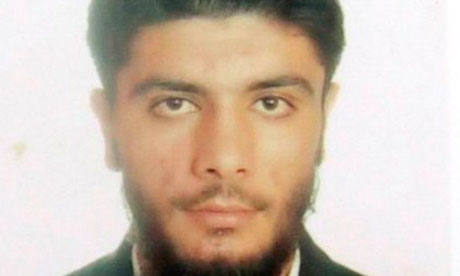Suspected al-Qaida terrorist extradited from Britain to US
Abid Naseer, originally from Pakistan, is accused of plotting attacks on Manchester shopping centres and New York subway

Abid Naseer, who has been extradited to the US after two years of legal arguments
A suspected al-Qaida terrorist accused of plotting attacks on Manchester and the New York subway has been extradited to the United States.
Abid Naseer, 26, had originally come to Britain from his native Pakistan on a student visa, ostensibly to study in Manchester.
But US prosecutors believe they can prove Naseer collected bomb ingredients, conducted reconnaissance and was in frequent contact with other al-Qaida operatives as part of a foiled plot to kill Easter shoppers at the Trafford and Arndale centres in Manchester in 2009, and a second suspected plot to blow up the New York subway.
After two years of legal arguments stalling his extradition, Naseer was finally taken from his cell at Belmarsh high security jail and put on a plane at Luton airport by officers from the Metropolitan police extradition unit on Thursday.
In a statement the Met said: "[Naseer] was sought for the purposes of standing trial for the following offences: (i) providing material support to a foreign terrorist organisation; (ii) conspiracy to provide material support to a foreign terrorist organisation; (iii) conspiracy to use a destructive device."
If convicted in the US, Naseer would face a maximum penalty of life in prison.
Naseer was one of 12 people arrested in April 2009 in co-ordinated raids in Liverpool and Manchester after police uncovered the alleged Manchester plot. But all were released without charge because of lack of evidence.
They were ordered to leave Britain, but Naseer escaped deportation to Pakistan after a judge ruled it was likely he would be mistreated if he were sent home.
Naseer was re-arrested in July 2010 in the north-east of England by Met police officers working with the north-east counter-terrorism unit, at the request of the prosecutors in Brooklyn, where a federal indictment named him as a co-defendant with Adis Medunjanin.
In January 2011, a British judge approved Naseer's extradition. The judge acknowledged there was a "very real risk" Naseer would be tortured if the US ultimately returned him to Pakistan but said he believed the US justice system would bear that in mind.
US authorities allege Medunjanin and his former high school friends Najibullah Zazi and Zarein Ahmedzay travelled to Pakistan in 2008 to seek terror training from al-Qaida.
Zazi, an airport van driver from Colorado, admitted in a guilty plea that when he arrived back from Pakistan he tested peroxide-based explosive materials in a makeshift lab in Denver in the autumn of 2009 before travelling by car to New York to carry out the scheme.
Authorities say Medunjanin and Ahmedzay agreed to join Zazi in three co-ordinated suicide bombings on Manhattan subway lines during rush hour near the eighth anniversary of the 9/11 terror attacks in what Zazi called a "martyrdom operation".
The alleged plot was disrupted when police stopped Zazi's car as it entered New York.
Abid Naseer, 26, had originally come to Britain from his native Pakistan on a student visa, ostensibly to study in Manchester.
But US prosecutors believe they can prove Naseer collected bomb ingredients, conducted reconnaissance and was in frequent contact with other al-Qaida operatives as part of a foiled plot to kill Easter shoppers at the Trafford and Arndale centres in Manchester in 2009, and a second suspected plot to blow up the New York subway.
After two years of legal arguments stalling his extradition, Naseer was finally taken from his cell at Belmarsh high security jail and put on a plane at Luton airport by officers from the Metropolitan police extradition unit on Thursday.
In a statement the Met said: "[Naseer] was sought for the purposes of standing trial for the following offences: (i) providing material support to a foreign terrorist organisation; (ii) conspiracy to provide material support to a foreign terrorist organisation; (iii) conspiracy to use a destructive device."
If convicted in the US, Naseer would face a maximum penalty of life in prison.
Naseer was one of 12 people arrested in April 2009 in co-ordinated raids in Liverpool and Manchester after police uncovered the alleged Manchester plot. But all were released without charge because of lack of evidence.
They were ordered to leave Britain, but Naseer escaped deportation to Pakistan after a judge ruled it was likely he would be mistreated if he were sent home.
Naseer was re-arrested in July 2010 in the north-east of England by Met police officers working with the north-east counter-terrorism unit, at the request of the prosecutors in Brooklyn, where a federal indictment named him as a co-defendant with Adis Medunjanin.
In January 2011, a British judge approved Naseer's extradition. The judge acknowledged there was a "very real risk" Naseer would be tortured if the US ultimately returned him to Pakistan but said he believed the US justice system would bear that in mind.
US authorities allege Medunjanin and his former high school friends Najibullah Zazi and Zarein Ahmedzay travelled to Pakistan in 2008 to seek terror training from al-Qaida.
Zazi, an airport van driver from Colorado, admitted in a guilty plea that when he arrived back from Pakistan he tested peroxide-based explosive materials in a makeshift lab in Denver in the autumn of 2009 before travelling by car to New York to carry out the scheme.
Authorities say Medunjanin and Ahmedzay agreed to join Zazi in three co-ordinated suicide bombings on Manhattan subway lines during rush hour near the eighth anniversary of the 9/11 terror attacks in what Zazi called a "martyrdom operation".
The alleged plot was disrupted when police stopped Zazi's car as it entered New York.
Labels: Britain, Immigration, Islamism, Terrorism, United States

<< Home